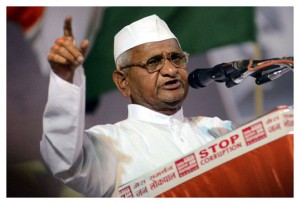The recent incident of gang rape in Delhi has raised many questions about the law, women’s rights in India, inaction by politicians as well as corruption in the political establishment in India. On a recent visit to South Africa, which faces its own significant challenges with respect to corruption, B24 discovered that the Indian situation is actually far worse.

Social activist Anna Hazare protests against Corruption in India
But have these annual anti-corruption movements and hunger strikes by strong public figures made any difference in real terms? The answer, unfortunately is no. According to the local watchdog, the Association for Democratic Reforms in India, some 158 out of 543 Members of Parliament – i.e. almost one third of all MPs in India face criminal charges. Even in South Africa, that is hardly the case despite some high profile cases in the courts leveled against president Zuma himself there.
To aggravate matters, the one third of dodgy statistic also extends to lawmakers across all states. About half of these, which totals over 600, in fact were recorded as being serious offenses like murder, rape, kidnapping, extortion, fraud and robbery. These very people are being given tickets by political parties to hold positions of real power at both state and national level. 36 of them have actually won polls – this includes 6 MPs! Now if that is deemed acceptable then India is really in trouble.
Corruption in India is generally accepted as a fact of life. The NGO Transparency International in their 2008 study showed that 40% of Indians had first-hand experience of offering bribes or using contacts in public office in order to complete some transaction or other. This corruption is largely facilitated by the massive bureaucracy that is Indian government. The mechanisms through which its executed include complicated tax and licensing systems subject to much subjectivity, excessive and inefficient regulation, poor corporate governance and discretionary powers given to public offices that don’t have adequate accountability processes in place.
So what is being done in India to address this situation? For one, the persons of authority facing more serious charges are being expected to quit voluntarily. One can only wonder if the candidate has no conscience in committing a particular crime, what chance is there that he will see it as a moral imperative to leave a cushy position in government?
With all the hype about Rahul Gandhi saving Congress and his stated strong conviction for anti-corruption laws, his party has given tickets to 24 candidates in the last 5 years alone, despite the corruption charges against them. The BJP fared better but hardly so with a tally of 5 tickets given to candidates charges with corruption. Other regional parties were found to be just as guilty.
When people that are of dubious honesty assume positions of power, there is a great likelihood that the the situation will perpetuate itself. All it takes, after all, is one rotten apple to spoil the basket. This situation does not lend itself well to achieving a progressive, corruption-free India. Further, it begs the question how serious is India really about squashing corruption?
For the moment, it seems that Indian politicians are quite content to simply manage corruption rather than squash it. When there is a public uproar such as that induced by the Anna Hazare type of mass action, then a tidbit concession is thrown to the public. But these tidbits are rarely of consequence to what is clearly an endemic corruption challenge that India now faces.
Appointing a government led commission of inquiry against corruption in India, such as that formed by the presidency in South Africa is likely to have zero effect. The challenge is that even the appointments to that commission may tainted before its actual work begins. The body investigating corruption needs to be an independent one to serve as a proper check-and-balance mechanism. Not only that, as Anna Hazare suggests, it needs to have real teeth that can do damage when corruption is found. Without such an independent public mechanism in place Indian politicians will continue to have the run of the roost and certainly no progress will be made. Until such a body is in place Indians have as much chance of solving the corruption problem as they have of winning if they take a chance on an online casino or if they decide to play lottery in India – they may be optimistic when they start off gambling or purchase the ticket but it only takes a very short time to realise that they were living a fool’s dream.
I agree with the article – I think leaving things to politicians when they have a vested interest in the outcome is necessarily a bad idea. Some kind of independent commission of inquiry needs to be set up in order to monitor and control the situation.
India’s economy is doing relatively well, just imagine how well it could be doing if corruption is under control.
I find these Indian corruption statistics appalling – it’s no wonder people like Anna Hazare need to make a stand. One can only hope that political parties stop condoning corruption by their inaction – personally I am not optimistic at all.
The problem is the system that Allows this sort of thing to go on. These must be some law in place that will bring any act of corruption to court.